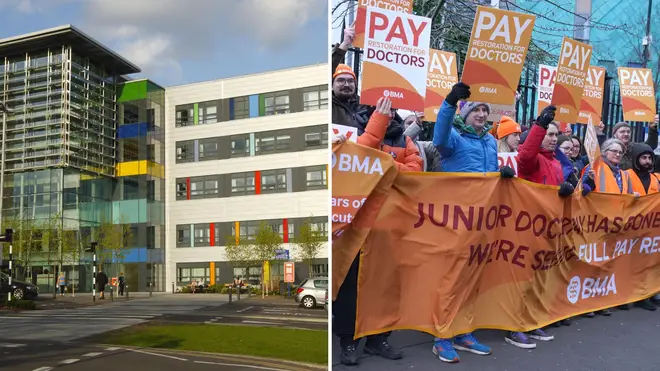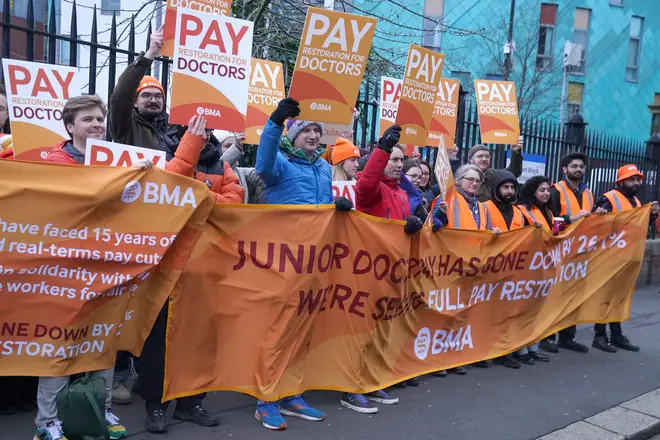
Richard Spurr 1am - 4am
3 January 2024, 18:06 | Updated: 3 January 2024, 21:09

A hospital trust has declared a critical incident for the third time in three months after reporting its A&E services were "full".
Services across England are facing "significant demand" on the first of a six-day walkout by junior doctors.
Portsmouth Hospitals University NHS Trust has declared a critical incident as it said its wards and emergency department were “full” on what is considered to be one of the busiest weeks of the year for the NHS.
It is the third time in the last three months the trust has declared a critical incident, following separate incidents in both December and November last year.
The trust has apologised for the delays, attributing it to increased demand paired with slow systems at the hospital.
Portsmouth Hospitals University NHS Trust said in a statement: "Portsmouth Hospitals University NHS Trust have [sic] declared a critical incident to protect patient safety as the hospital and emergency department is full.
"Our hospital has been under pressure for a while and we are already experiencing a difficult week, following the bank holiday weekends, and as we cope with increasing winter pressures and low staffing numbers, particularly in our Emergency Department.
"We need help from our community to make sure that our hospital can continue to care for those who need our services."

It also said: “This is due to the combination of delays across our system and an increase in demand for services causing intolerable delays for our patients, increasing the risk for patients requiring an emergency response in the community.”
The trust said anyone attending its A&E department who did not need to be treated there would be redirected to a different service.
It comes after hospitals in Lewisham and Greenwich confirmed on Wednesday they had put in a request to recall doctors from the pickets for the first time ever as the NHS faces one of its busiest weeks of the year.
Lewisham and Greenwich NHS Trust confirmed that it has been forced to make a mitigation request to recall doctors due to “very challenging” levels of demand.
A spokesperson for the trust said: “LGT runs two busy London hospitals – University Hospital Lewisham and Queen Elizabeth Hospital in Woolwich. Strikes are always difficult to work through, but this one coincides with what is typically our busiest week at the Trust, so is proving very challenging.
“Our teams are working extremely hard and we are doing our best to deliver good levels of patient care. “Patient safety is our number one priority, and it is of paramount importance that we have enough staff to keep our hospitals safe. To this end, we have submitted safety mitigation requests for additional Doctors to work during the next few days.
Read more: NHS cancellations to surpass one million as junior doctors begin longest strike in NHS history

Nick Hulme: Impact of junior doctors strikes is 'absolutely huge'
“The current very high levels of patient demand, coupled with the number of medical staff working on-site, leaves us hopeful that our request will get the green light and we’ll soon have more Doctors available for patients.”
Thousands of members of the British Medical Association (BMA) began the biggest walkout in NHS history on Wednesday.
Junior doctors are set to strike for six days, having started at 7am on Wednesday and lasting until 7am on January 9.
Patients are expected to be hit by more than 200,000 cancellations during the walkout, as the health service has warned the strike could mean “one of the most difficult starts to the year the NHS has ever faced”.
NHS leaders have warned the action will hinder efforts to reduce waiting lists and may put people off seeking care.
Nick Hulme, the chief executive of East Suffolk and North Essex NHS Foundation Trust, said that the "impact on patients is absolutely huge".
He told LBC's Nick Ferrari of "the hundreds of operations that we've had to cancel, the thousands - across the three hospitals I’m responsible for - of outpatient [appointments] we’ve had to cancel."
Mr Hulme said "these are people who’ve already waited a very, very long time. So although we will maintain emergency service, we can assure people that if they require urgent care, maternity, A&E, ITU etc, the care will be safe, this has absolutely decimated our plans to attack the long waiting times."